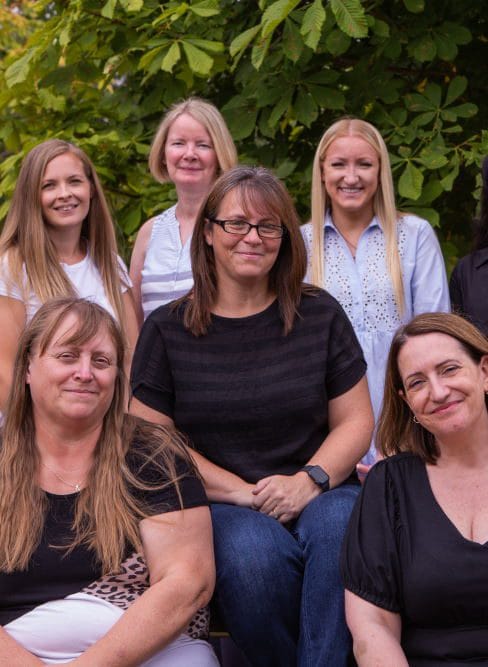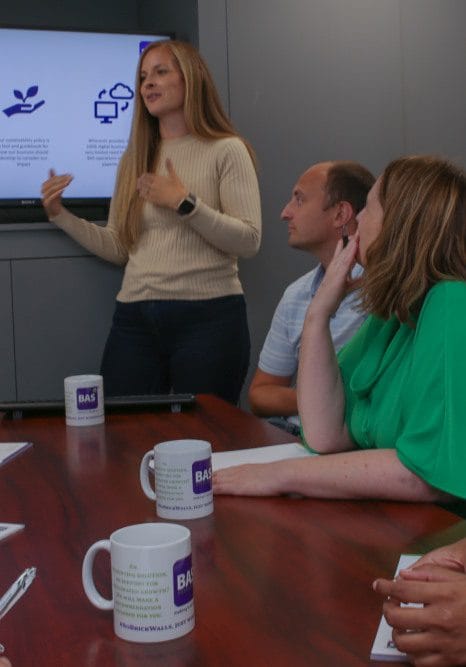FAQ's
Take a look at some of the technical questions we’re asked on a regular basis.
Tax | VAT | Payroll | Business Planning | Business Coaching


A download of some of our experts’ knowledge.
Let’s face it being in tax, accountancy & business development our FAQ’s section could be bigger than the rest of our website and we could spend years writing questions and answers.
So, this page has been created by the BAS team based on questions clients ask on a regular basis.
Do I need to complete a tax return? Should I register for VAT? Should I have a Payroll/PAYE scheme for my business?
Do I need a business plan? What is involved in business coaching?
If the answer to your burning question isn’t below, then get in touch and a member of the team will give you all the answers your need!
Tax
What is Income Tax?
Income Tax is a tax you pay on your income. There are various rates of tax dependent upon your income. The more you earn the more you pay (probably).
You will pay tax on:
- Money you earn from employment
- Profits you make if you’re self-employed
- Some state benefits
- Most pensions, including state pensions, company and personal pensions and retirement annuities
- Interest on savings and pensioner bonds
- Rental income (unless you’re a live-in landlord and get £7,000 or less)
- Benefits you get from your job
- Income from a trust
- Dividends from company shares
There are several things you don’t pay tax on. Tax laws are complex but that’s where we’re here to help
Here are the current Income Tax rates
Please contact us if you need some help with your Income Tax
What is a tax-free Personal Allowance?
The personal allowance is the amount of income each person is entitled to receive before they start paying tax.
Your Personal Allowance may be bigger if you claim Marriage Allowance or Blind Person Allowance and it may well be lower if your income is over £100,000 a year.
You can read more about the current tax-free Personal Allowance here.
What is Self-Assessment?
Self-assessment is the system that HMRC use to collect income tax.
Tax is usually deducted from wages, savings, and pensions. People and businesses with other income must report it in a tax return.
Do I need to complete a Self-Assessment tax return?
If your accountant or HMRC haven’t already advised you that you need to complete a self-assessment tax return, and the reasons why, then here are some reasons why you may need to complete one:
- You are an employee but want to claim tax relief on expenses of more than £2,500 per year
- You let property or a room in your home and receive income from renting (above certain limits each year)
- You have taxable foreign income from overseas savings, investments, pensions, or employment
- You are self-employed and have an income of more than £1,000 per year
- You are an employee but didn’t pay the correct amount of tax through your tax code
- You are not a UK resident but receive property income in the UK
- You have income from savings and investments of more than £10,000
- You work in a business as a partner
- You or your partner receive child benefit and your income is over £50,000 (this has increased to £60,000 as of 6th April 2024)
There may be cases where none of the above applies to you and HMRC send you a letter stating you need to complete your self-assessment. If this is the case, your accountant can liaise with HMRC to understand why and in some cases update HMRC’s information if they believe you do not need to complete a self-assessment.
What is the deadline for completing Self-Assessment tax returns?
The deadline for submitting your self-assessment tax return is 31st January after the end of the tax year. This is the same each year.
If an accountant is completing your self-assessment tax return on your behalf, they are likely start to requesting the information they need to complete your tax return in advance of this date.
How can a Self-Assessment tax return be submitted?
You can complete your self-assessment tax return by yourself and file your tax return online or send a paper form (SA100).
If you are completing your own self-assessment, take time to ensure you fill in all the right sections, and any supplementary pages, so HMRC are fully aware of the different types of income.
Income tax and allowances can be challenging to understand and subsequently complete the return correctly and in the most tax efficient way. Therefore, it is often beneficial to have an accountant complete your tax return on your behalf.
Can someone else complete my Self-Assessment on my behalf?
Yes, you can authorise someone else to deal with HMRC for you. This could be your accountant, a friend or a relative.
Your accountant can take you through the steps authorising them to be your agent to handle your tax affairs.
Can my Self-Assessment Tax Return be filed early?
Yes, your self-assessment tax return can be submitted as soon as the tax year ends.
At BAS we work to complete all self-assessment tax returns well in advance of the 31st January deadline.
Filing early has a few benefits:
- It can help manage your tax bills or financial planning for the year by finding out how much is owed
- If you are owed a refund, you’ll get it sooner
- Avoiding having to pay your tax bill at the same time as filing your return, so there is to time to plan how to pay
What is Capital Gains Tax (CGT)?
Capital Gains Tax is a tax on any profits made when you sell or dispose (giving away as a gift, transferring ownership, swapping, getting compensation) of an asset that has increased in value. It is only the gain that you make that is taxed not the amount of money you received for the asset.
Some assets are tax-free, and you may not have to pay CGT if all the gains in a year are under your tax-free allowance. There are also special rules for gifts or assets that are disposed to your spouse, civil partner, or charity.
Capital Gains Tax can be complex so if you need any support, please contact us.
What records do I need to keep for Capital Gains Tax (CGT)?
The records you will need include all receipts, bills and invoices that show the date and amount:
- You paid for an asset
- You received for the asset
You should also keep copies of:
- Any additional professional advice or to establish market value
- Any contracts relating to the buying and selling of the assets
- Any copies of valuations
- Any expenditure on the asset which has increased it’s market value
How long do I need to keep records relating to Capital Gains Tax (CGT)?
Records will be required to work out the gains that need to be completed in your self-assessment tax return. As an individual you will need to keep any records relating to CGT for at least a year, but if you file your tax return late or HMRC want to complete a check you will need to keep them for longer. Businesses must keep records for 5 years after the deadline.
What is CIS?
Construction Industry Scheme (CIS) is the process of contractors deducting money from subcontractor payments and passing on these deductions to HMRC. These deductions count as advance payments towards the sub-contractor’s tax and national insurance (NI).
Who counts as a contractor or subcontractor for CIS?
You are considered a contractor if:
- You pay subcontractors to complete construction work
- Your business doesn’t do construction work, but you have spent more than £3M on construction in the 12 months since you made your first payment
You are considered sub-contractor if you do construction work for a contractor.
Who needs to register for CIS?
Both contractors and subcontractors must register for CIS. You must register for both if you fall under both categories.
You can register as a contractor here.
You can register as a sub-contractor here.
Which work is covered by the Construction Industry Scheme (CIS)?
CIS covers most construction work to:
- A permanent or temporary building or structure
- Civil engineering work like roads and bridges
For CIS, construction work includes:
- Preparing the site for example, laying foundations and providing access works
- Demolition and dismantling
- Building work
- Alterations, repairs, and decorating
- Installing systems for heating, lighting, power, water, and ventilation
- Cleaning the inside of buildings after construction work
This CIS guide for contractors and subcontractors has more detail on what is and is not covered by the scheme.
VAT
What is VAT (Value Added Tax)?When do I need to register for VAT?
VAT (Value Added Tax) is a tax added to most products and services sold by VAT-Registered businesses.
When do I need to register for VAT?
A business must register for VAT if:
- Your turnover is more than £90,000 for the last 12 months
- You expect your turnover to exceed £90,000 in the next 30 day
Your turnover is the total value of everything you sell that is not exempt from VAT.
If everything you sell is exempt from VAT, you may not need to register for VAT. Some businesses choose to register for VAT even if their turnover is less than £90,000 via a voluntary registration.
You must also register for VAT if all the below are applicable to you:
- You are based outside the UK
- Your business is based outside the UK
- You supply goods or services to the UK
Need some support with your VAT Registration? Get in touch with one of our VAT experts.
What do I need to do if I am VAT-registered?
. a VAT-registered business you must:
- Charge VAT on the price of all goods sold and services provided
- Ensure VAT is charged at the correct rate
- Keep records of how much VAT you incur on expenditure
- Keep records of VAT paid on goods you import to the UK
- Report the amount of VAT you receive
- Report the amount of VAT you paid to other businesses
- Complete a VAT return to HMRC usually every 3 months
- Pay any VAT you owe to HMRC
If you are registered for VAT, you must submit a VAT Return even if you have no VAT to pay or to reclaim.
You can submit your own VAT return however there are different VAT rates, and possibly other adjustments to make. To ensure your VAT return is accurate and includes all the claimable VAT your accountant can complete your VAT return on your behalf.
Our specialist VAT team provide three different services depending on your requirements. Contact us to understand more about how we can help with your VAT returns.
What information does my accountant need to complete my VAT Return?
The information your accountant will ask for to complete your VAT Returns include:
- Sales Invoices
- Purchase receipts
- Personal business expenses
- Business mileage (where the car is not a company vehicle)
- Bank & credit card statements
Clients of BAS receive reminders via Senta (our client portal) detailing the information we need to complete the VAT return. All of these documents can be uploaded to Senta as a secure digital way to share documents.
When is my VAT bill due for payment?
If you’ve charged more VAT than you’ve paid, you must pay the difference to HMRC one month and 7 days after the end of your VAT accounting period.
If you have paid more VAT than you have charged, then HMRC will usually pay you the difference.
If we are completing your VAT returns on your behalf, we will let you know how much is due to be paid (or refunded to you), how to make the payment and the deadline to make the payment.
For help with your VAT return please contact our specialist VAT team.
How do I pay my VAT bill?
There are two ways to pay your VAT bill:
- Direct Debit
- Online via the UK website
Paying by direct debit is the cheapest way to pay. Any VAT bills that are due will be collected automatically on the 10th of the month following the due date of your VAT return.
Paying manually via the gov.uk website with a card typically carries a card processing fee.
What happens if I don't register for VAT, but my turnover is over £90,000?
If you meet the requirements to register for VAT and fail to do so, then you may face penalties.
The fine will be worked out based on the VAT owed and how late the registration was. The VAT you owe from the point of registration will be added to your penalty which can get expensive quickly!
You will also be required to pay over VAT on 1/6 of your sales that fall into the late registration period. If you only deal with fellow VAT-registered businesses you may be able to add the VAT to your sales and recover this amount from them. You will also be able to recover VAT on any expenditure during this period.
Need some help with your VAT registration or concerned about a potential fine? Speak to one of our VAT experts on 01296 681341.
Can I still invoice customers while I am waiting for my VAT number?
When you register for VAT, there will be a crossover between submitting your application for VAT and getting your VAT number.
If you still want to invoice customers, then you can’t show VAT on your invoices until you have a VAT number. However, you will still have to pay the VAT to HMRC for any sales you make in this period.
As you will need to pay HMRC VAT on your sales then you can increase your rates by the relevant VAT amount. So, for a £100 product at the standard VAT rate, you can increase your price by 20% and charge £120.
Once you have your VAT number you can re-issue the invoices showing the VAT amount. Then your customer can also reclaim any VAR on their purchase from you.
Some businesses prefer to delay issuing invoices until the VAT number has arrived however the lead time for some VAT Registrations can take several weeks. So delaying invoicing may impact cashflow.
Payroll
What is payroll?
Traditionally payroll relates to a list of employees, within a company, and how much they are paid. However, the term payroll is now more commonly used to describe employee wages and the act of making a record of the amount of money an employee has earned over time.
As an employer, you normally have to operate PAYE (Pay As You Earn) as part of your payroll. PAYE is HMRC’s system to collect income tax and national insurance from employment.
Do I need a payroll scheme for my business?
Payroll is essential in any business in which people are employed to work. This is because Payroll is required to:
- Calculate how much employees need to be paid
- How much tax and National Insurance needs to be deducted from an employees gross pay
- Report employee details to HMRC
- Pay your employees
As an employer, you normally have to operate PAYE (Pay As You Earn) as part of your payroll. PAYE is HMRC’s system to collect income tax and national insurance from employment.
For help with your payroll get in touch with our payroll specialists.
What information is required for payroll?
To run payroll, there are several details that are required, such as:
- Employee Details
- Employee hours
- Salaries, wages, and gross/net pay
- Additional payments
- Tax and deductions
- Employee benefits
Within each of these areas further detail may be required to ensure the employee and business make the right payments and deductions.
Should I outsource my payroll?
On the face of it, payroll may seem like a simple task however it is crucial that you get your payroll right and keep it within the law. Choosing how to manage payroll is an important decision and is something you should prioritise.
If you don’t have the administrative resources or expertise to run payroll, then seeking support from a professional will help to:
- Minimise errors – a professional should be using software with automation to reduce the risk of manual data entry errors or calculations
- Ensure compliance – government regulations change, and professionals will often learn about these changes in training updates and can then take the lead in making the necessary adjustments
- Meet deadlines – there are HMRC payment deadlines for employers and if you don’t comply with the regulations or meet the necessary deadlines there are fines and other associated costs
- Complete all reporting – each month employee payments and deductions need to be reported to HMRC on or before each payday
- Save time – leaving payroll processing and management to those that have the relevant expertise can give you more time to focus on your business
Finally, if you are the director of a company, then there may be a more tax efficient way to pay yourself using a combination of payroll and dividends. A payroll professional can actively manage this on your behalf.
Want to understand more about our payroll services? Speak to our in-house payroll specialists.
How much PAYE do I owe to HMRC?
For BAS clients the answer is simple, there is a dedicated section in your Bright Pay portal labelled HMRC this will clearly show any outstanding liabilities.
If you run payroll yourself, you will need to calculate what you owe HMRC yourself and then pay HMRC yourself.
Regardless of the services you select all clients will benefit from:

Free ongoing advice
We want you to succeed
Online portals
Access all historic and current accounts or returns at any time
No surprises
We will never send you a surprise bill for calls, emails or meetings
We keep it simple
We're not a fan of jargon either
Peace of mind
If we say we're going to do it, it will get done
Value for money
We work as efficiently and price as competitively as possible
Everything starts with a conversation,
how can we help?

Brett Smith
Tax & Accountancy

Sian Smith
Business & Development
